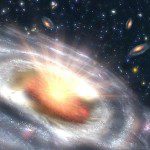
This image of a pair of interacting galaxies called Arp 273 was released to celebrate the 21st anniversary of the launch of the NASA/ESA Hubble Space Telescope. The distorted shape of the larger of the two galaxies shows signs of tidal interactions with the smaller of the two. It is thought that the smaller galaxy has actually passed through the larger one.
(NASA, ESA and the Hubble Heritage Team [STScI/AURA])
I’m sitting on an open-air balcony looking across a golf course up at the mountains during a gentle but solid rain. The aroma is delicious. Life can be very good.
The remarks below are based largely though not quite entirely upon Roger Trigg, Does science undermine faith? (London: Society for the Promotion of Christian Knowledge, 1918), 1-11. Roger Trigg is Emeritus Professor of Philosophy at the University of Warwick and Senior Research Fellow at the Ian Ramsey Centre of the University of Oxford, as well as a Fellow of the International Society for Science and Religion. Among other things, he is the author of Beyond Matter: Why Science Needs Metaphysics, which I own and greatly enjoyed.
Professor Trigg cites the text of a placard that appeared at a “March for Science” in Washington DC and that, he says, has been replicated in similar gatherings elsewhere around the world. “If it isn’t science,” read the placard, “it’s fiction.”
What the placard claims is that, if something can’t be empirically verified or experimentally replicated, if it can’t be demonstrated or proven in a laboratory or a scientific expedition in the field, it’s a mere story. Science, so the claim goes, reins supreme. It is the only path to genuine knowledge, the only way to real truth.
And the reference is to “science” in a very specific sense. Originally, the Latin term scientia meant “knowledge.” At least in English, though, the term has grown more and more narrow over the past couple of centuries or so. Now, it is typically taken to refer to the discipline and the results of empirical observation and experiment.
But, as Professor Trigg observes, this wasn’t always so. At the University of Cambridge, he points out, philosophy was studied until fairly recently under what were called the “Moral Sciences.” And theology was, not that long ago, often termed the “Queen of the Sciences.” In this regard, the English word science once carried the expansive sense that the German word Wissenschaft, with which it is usually translated, still does. Thus, for example, German-speakers still commonly talk about Literaturwissenschaft (literally, “literature science” or “literary science”) and they commonly refer to the “arts” or the “humanities” as die Geisteswissenschaften (literally, the “spirit sciences”) in order to distinguish them from die Naturwissenschaften (“the natural sciences”). (For a bit more on this particular topic, see my 2020 blog entry “English “Science” and German “Wissenschaft.””)
If experimental or empirical science is the only path to truth, Professor Trigg notes,
Vast tracts of human experience . . . have nothing to do with what is true. Theories of goodness, beauty, or what is right, become just ‘fiction.’ They become stories we choose to live by with no universal validity, and no claim to reflect the world as it is. (2)
Professor Trigg traces such ideas back to the famous and influential “Vienna Circle” of philosophers (the Wiener Kreis) in the years before the Second World War. (I wonder, parenthetically, what the members of the Vienna Circle, many of whom — e.g., Gustav Bergmann, Herbert Feigl, Felix Kaufmann, Richard von Mises, Moritz Schlick, Friedrich Waismann, and, on the periphery, Ludwig Wittgenstein — were Jewish, made of the Third Reich when it emerged. Did evil, for them, remain mere arbitrary “fiction”? A good question for further research.)
The views of the Vienna Circle were popularized in the English-speaking world by A. J. Ayer, with his important 1936 book Language, Truth and Logic.
For Ayer, truth and meaning were tightly bound to scientific verification. What a scientist could not find out was not real.
For example, if someone says to you that there is a “heffalump” in her garden, you may want to go and have a look at it. Perhaps, though, she says that it’s invisible. Perhaps she even says that it’s indescribable. You might well be pardoned for responding that there seems little or no difference between having a “heffalump” in the garden and not having a “heffalump” in the garden. And what was true of such a “heffalump,” Ayer said, was exactly true of such supposed entities as, well, God.
At this point, I add that, for Latter-day Saints, God is not only not in principle invisible, he has been seen.
But we should pause for just a moment on theoretical grounds. The statement that whatever isn’t science is therefore fiction is, itself, not a scientific statement. It can’t be demonstrated in a laboratory or by examining deposits of sedimentary rock. It’s a statement about science, but it isn’t itself science. It is metascientific. So is it, therefore, fiction?
And exactly the same can be said about declarations that reality is that which is within the reach of science (in the very specific English sense of the word), and that anything beyond the reach of science is, therefore, not reality.
Moreover,
Narrowing the idea of evidence and reason to what happens within science makes it impossible to explain why we should practise science in the first place. (11)
Furthermore, we trust science because we see its results. Which is to say that, in a very real sense, we are able to judge it because we stand outside of it. (To which I add that faith and/or religious involvement can be judged by their results, too, and that these are increasingly clear and well-documented in terms of physical, mental, familial, and social health. Moreover, testimonies of miracles and religious experiences suggest a possible way of inferring the presence even of an unseen divinity, in somewhat the same way that modern scientists infer the presence of subatomic particles and exoplanets not from direct sight but from their effects on other objects.)
But our science is now, and probably always will be, limited. During the time in the 1950s and 1960s that A. J. Ayer was teaching philosophy at Oxford, some “verificationists” began to wonder, quite seriously, whether we could talk meaningfully about the other side of the Moon since, at that time, no Earthling had ever seen it. So they began to speak, instead, of what was in principle within the range of verification or falsification by means of science.
Here again, though, we run into difficulties:
Vast tracts of the universe lie beyond our ability in principle to observe them, just as there are quantum events at microscopic level beyond the capability of our instruments to measure. As a result, scientists, particularly in physics, have come to recognize the reality of entities, both large and very small, that we can never see, and may perhaps be always inaccessible. The role of theory in science, going far beyond the baseline of observation and experiment, has been stressed more and more in the philosophy of science over the last 50 years. The burning contemporary question is how far physics can stray from what we can in principle test, and still count its subject matter as ‘scientific,’ rather than going beyond science into so-called ‘metaphysics’. [From what I’ve seen, this question is often raised, for instance, in connection with so-called “string theory.” — dcp] Some physicists quite seriously want to talk about many universes, even an infinite number, all of which are by definition beyond our reach and may have different, even unimaginable, physical laws. Yet why should talk of such universes, so different from our own that their nature is inconceivable to us, be regard as more within the scope of rational explanation than a God who is the source and grounding of everything? Saying that the one is scientific and rational, but that reference to God is irrational because unscientific, seems arbitrary, if not inconsistent. (4-5)
Posted from Park City, Utah













